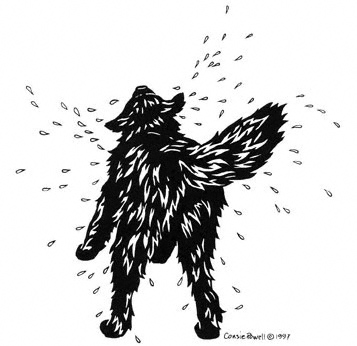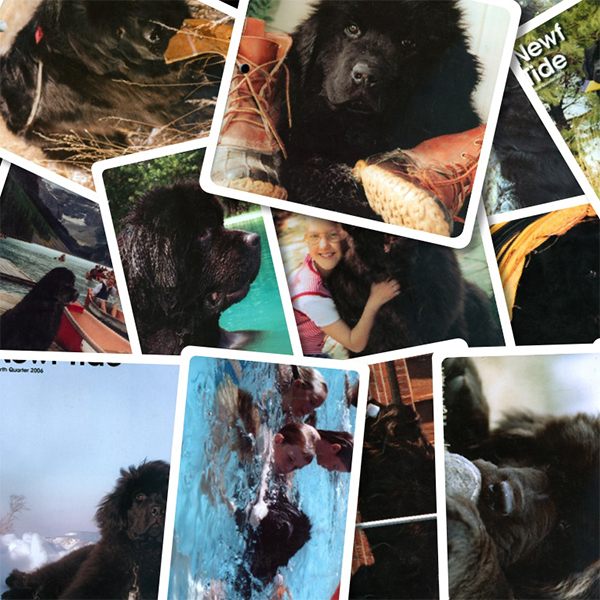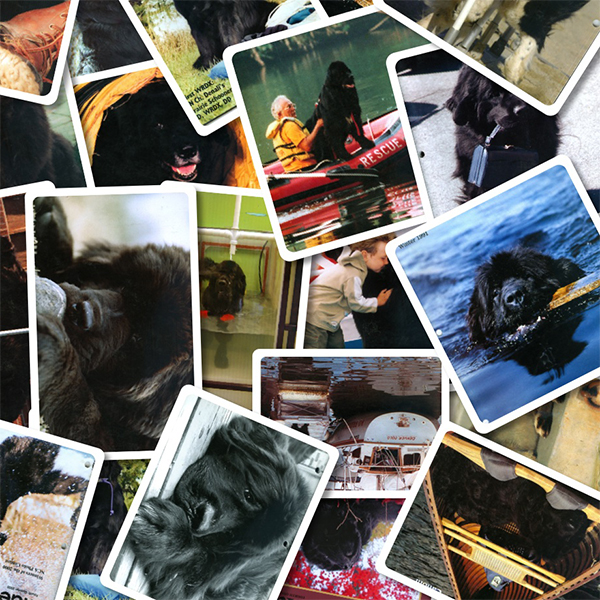by Roger Powell
 |
When Nokomis puts her kong in my lap, I know what she wants. She wants to play. When I am sitting at the dining room table and Ishkoodah puts her head on my thigh, I do not know exactly what she wants but I do know the two options: either she wants some love (most likely) or she is begging (only slightly less likely). Sometimes, however, I have no idea why my dogs do what they do. Why does Ishkoodah lift her head from my lap, look sweetly into my face, and belch? Why do dogs do such irrational things? I believe that somewhere in their ancestral past, the irrational behavior, or a related behavior, made sense. |
Take rolling in foul smells. All our dogs like to roll on their backs and often roll on their backs on the living room rug and on leaves in the woods. When Milakokia starts rolling outside on her back, however, I come running. More than any other of our dogs, she chooses to roll in foul smelling substances. I try to get to her before she has worked the foul smell deep into the hair on her shoulders and back. If I do not get to her in time, she trots to me and smiles: "Don't I smell good?"
Wolves roll in strong smelling substances and the behavior appears to be related to two functions. First, when a wolf, even a subordinate wolf, rolls in something really exciting, say a rotten fish, he or she walks proudly when he returns to other members of his pack. The other pack members crowd him, smell his shoulders and back, and wag their tails excitedly. No one knows for certain why they do this. Second, wolves have scent glands on their shoulders. The hairs over those glands are stiff and stand up more than other hairs down their backs. When a wolf rolls on its back and rubs its shoulders into the ground, he leaves his scent on the ground.
I suspect that the behaviors are related as follows.
Wolves are attracted to novel smells. Were a wolf to put his smell on a nondescript piece of ground, the chances of another wolf finding his scent mark are small. If he puts his mark where an attractive smell already exists, other wolves may notice his mark. His scent mark also functions to reassure pack members that they are in their own territory and to warn non-pack members that they not in their territories. But why should the wolf appear so pleased to announce the novel smell to his pack members? Maybe he is introducing them to a scent they need to learn because that scent, in the woods, now bears their pack scent. Maybe. And maybe that explains why Milakokiais so pleased to display her exciting new odors to me, but I am not certain.
A behavior that baffles me even more than rolling in foul smells is shaking off water next to a favorite person. Why do my dogs, when they leave the water, insist on walking over next to me, or at least some person, before they shake? If I move, they stop shaking, move with me, and then resume the shake. I can only surmise that shaking off water must have a social context for wolves, but for the life of me I cannot figure out what it might be.
And then, what about that belch? That, too, must have a social context, but I cannot imagine what it is. Do wolves announce to each other that they are pleased to have eaten a good meal? Do they reassure each other that they have all eaten the same food? Or during summer, when wolves often hunt singly, does a belch communicate to other wolves that a particular prey is easy to catch, young snowshoe hares, for example? If you have an idea, please tell me.
One behavior that baffled me at first but, with a little thought, made sense was Nokomis's preference for our other dogs' food. Nokomis will not eat her own food until Milakokia, especially, and Ishkoodah have finished their meals. When each of the older dogs finishes, Nokomis cleans her bowl. Only after both bowls for the old girls are empty and cleaned will Nokomis pay any attention to her own bowl.
This does make sense. Nokomis is on the bottom of our canine totem pole and Milakokia is on the top. Alpha wolves eat first and have priority access to the choicest foods; subordinate wolves must wait to eat if food is limited and must yield the choicest cuts to the alpha pair. Hence, the dominant wolves have access to the best food and subordinate wolves know that what the alpha pair leaves is likely to be better than other foods available. I believe this explains Nokomis's behavior: She believes that Milakokia's food must be the best, since Milakokia is her alpha.
That Milakokia has food formulated for old dogs and that Nokomis is best off eating her own food, formulated for young dogs, makes no difference to Nokomis. Milakokia is alpha and therefore must have the best food. Can Consie and I teach her differently? I expect we could, but only with great difficulty. We shall not try.
Our dogs have behaved in other ways that have baffled me, and I expect to experience new bafflements in years to come. Why does Nokomis bump me with her nose to get attention? Why did Kaloosit pick up one piece of food, place it on the floor, and prance around it before eating? Why do our young dogs insist on attacking the older dogs in play before going for a walk or a ride? I have a possible explanation for the latter but not the other behaviors, and I shall let that explanation wait for another column.
What about your dogs? Do they sometimes baffle you?
Drop me a note and tell me how. And when your girl looks lovingly into your eyes and belches at you, give her a hug from me.
reprinted from NewfTide 1998

